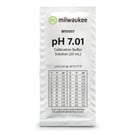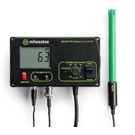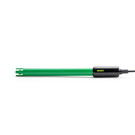Milwaukee pH monitor
The Milwaukee MC120 PRO High Range pH monitor offers lab grade accuracy with an easily viewable continuous check on pH levels with alarms.
Read more...| Article number: | 54.2.5 |
| Quantity: | 3 |
Milwaukee pH monitor MC120 PRO
The Milwaukee MC120 PRO High Range pH monitor offers lab grade accuracy with an easily viewable continuous check on pH levels with alarms.
Design Features
- Fast easy to read results with large digital LCD readout.
- Accuracy to ± 0.2 pH with a full 0.0 pH to 14.0 pH range.
- Set point range of 5.5 to 9.5 pH with alarm activated when reading is higher or lower than set point
- Comes with full mounting kit including probe holders.
- Lab grade probe included with a double junction, gel filled design for low maintenance.
Use and Care
pH meters usually start performing poorly because of problems with the probe. The two parts of the pH probe that cause problems are the glass sensing bulb and the reference junction.
Sensing bulb
The glass bulb loses sensitivity with use and will eventually fail. This is true of all pH probes.
Reference Junction
The reference junction is a small whole that allows the meter to compare the sample to a reference. The reading is generated based on the electrical difference between the sample and reference. If the junction hole gets clogged, the pH electrode will no longer function.
You can extend the life of your pH electrode in the following ways.
Storage
The pH probe needs to be kept hydrated. Long periods of dry storage will damage the sensitivity of the probe. Allowing the probe to dry out may also result in the junction hole getting clogged.
Storing in pH probe storage solution or pH calibration buffers will help address both these issues.
Do not store in tap water and DI water. This will damage the sensitivity of the probe.
The best way to store the probe is with the probe's cap filled with storage solution or calibration buffer and the cap tightened to prevent leakage. It is also recommended that to store the electrode upright to further reduce the potential for leakage.
Cleaning
Residue from the sample can impact the sensitivity of the sensing bulb and clog the junction. This is especially true if the sample has a lot of organic material. We recommend regularly soaking the probe in cleaning solution.
Calibration
The pH sensing bulbs become less sensitive over time so make sure that you are calibrating reguarly to keep your PRO pH meter accurate.
Specifications
- pH Range: 0.0 - 14.0 pH
- pH Resolution: 0.1 pH
- pH Accuracy: ± 0.2 pH
- Calibration: Manual 2 points
- Setpoint range: 5.5 to 9.5 pH
- Alarm Active: when reading is higher or lower than set point
- pH Electrode: MA911B/2 (included)
- Environment: 0 to 50°C / 32 to 122°F; max RH 95%
- Power Supply: 12 VDC adapter (included)
- Mounting kit (Included)
- Dimensions: 5.9 x 3.2 x 1.35 inches
- Weight: 6.3 ounces (meter only)
Check here for the user manual.











